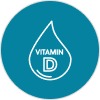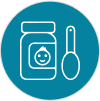Dietary Guidelines Focusing on Infants & Toddler Recommendations
3 min read • By: Gerber Medical Hub

Test Your Knowledge
Which of the following are included in the key recommendations from the 2020-2025 Dietary Guidelines for infant and toddlers to ensure optimal nutrition?
- Exclusive breastfeeding for the 1st 6 months and continued throughout the 1st year of life or longer if desired
- Provide supplemental Vitamin D soon after birth
- Beginning nutrient dense foods around 6 months, but not before 4 months
- Include foods rich in iron and zinc once complementary foods are introduced
- Include potentially allergenic foods, such as peanut and egg, in the infant diet when starting solids
- All of the above
- A, C, D, and E only
f. All of the above
2020-2025 guidelines
Good nutrition plays a critical role in the optimal development of infants and toddlers and it is imperative that all healthcare professionals support parents and caregivers in their efforts to incorporate healthy dietary patterns from birth. The Dietary Guidelines for Americans provide advice on what to eat and drink to meet nutrient needs, promote health, and help prevent chronic disease.
The 2020-2025 guidelines include first-of-their-kind nutrition recommendations for infants and toddlers as well as pregnant and lactating women in an effort to "make every bite count". The US Department of Agriculture and Department of Health and Human Services have jointly published the guidelines for Americans every 5 years since 1980 to educate government officials and affiliated public health programs, healthcare professionals, and other public and private sector entities about diet and health.
Key Recommendations for infants and toddlers adapted from the Dietary Guidelines are below.
Key recommendations for infants

For about the first 6 months of life, exclusively feed infants human milk and continue through at least the first year of life, and longer if desired.

Feed infants iron-fortified infant formula during the first year of life when human milk is unavailable.

Provide infants with supplemental Vitamin D beginning soon after birth.

Begin nutrient-dense foods from all food groups at around 6 months of age, but not before 4 months. Foods should be age and developmentally appropriate.

Include foods rich in iron and zinc, such as infant cereal. Two servings of infant cereal a day meets baby's need for iron - a critical nutrient for healthy brain development, learning ability and immune function.

Include potentially allergenic foods, such as peanut and egg, in the infant diet when starting solids.
Key recommendations for toddlers
Encourage toddlers to consume a variety of nutrient-dense fruits, vegetables, whole grains, protein foods (including lean meats, poultry, eggs, seafood, nuts, and seeds), dairy (including milk, yogurt, and cheese), and oils. Toddlers need these foods in developmentally appropriate forms.
The second year of life is a unique time when children continue to have high nutrient needs from small amounts of foods. Encouraging early acceptance among infants and toddlers of a variety of nutritious foods may help them build healthy habits from the start.
The diets of infants and toddlers have virtually no room for foods with little nutrition and mostly added sugar. In particular, avoid sugar-sweetened beverages like fruity drinks for babies and toddlers. Also limit foods and beverages higher in sodium.
Additional Articles and References
- Dietary Guidelines for Americans 2020-2025
- New dietary guidelines address infants, support healthy dietary patterns
- Food Consumption Patterns of Infants and Toddlers: Findings from the Feeding Infants and Toddlers Study (FITS) 2016
- Resources to help your families follow the new dietary guidelines: U.S. Department of Agriculture MyPlate



